PCOS (Polycystic Ovary Syndrome) and PDOS (Polycystic Ovary Disease) are
related terms that refer to a hormonal disorder that affects the
ovaries in women.
Call us to book a appointment with the gynaecology specialist near you.
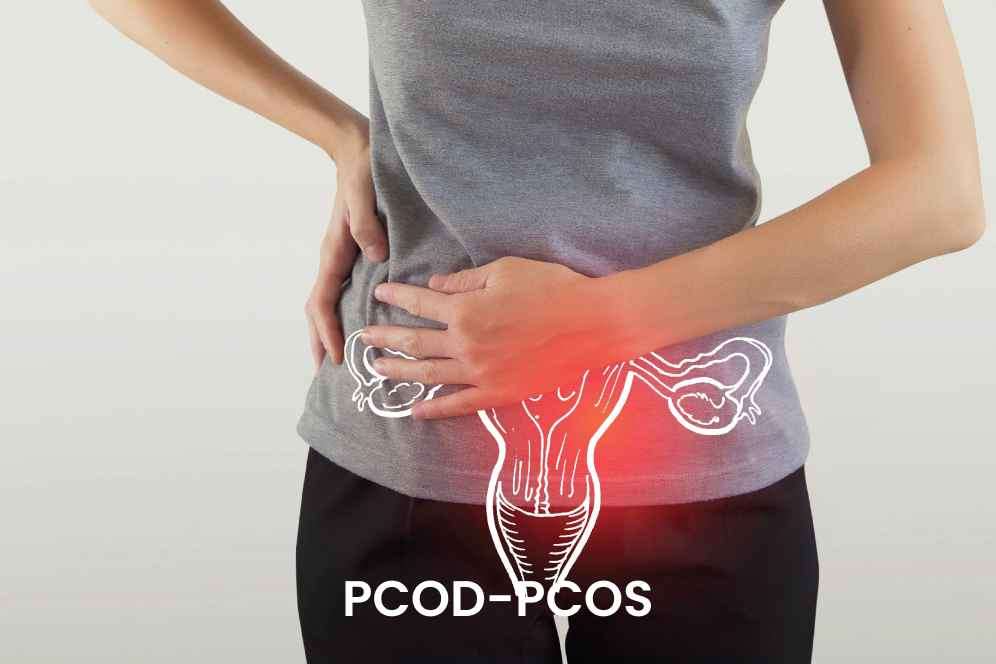
1. Irregular Menstrual Cycles: Women with PCOD/PCOS often experience irregular or infrequent periods, or they may even experience prolonged periods. 2. Hormonal Imbalances: PCOD/PCOS can cause elevated levels of androgens, leading to symptoms such as acne, excess hair growth (hirsutism), and male pattern baldness. 3. Ovarian Abnormalities: The presence of multiple cysts on the ovaries can be detected through an ultrasound examination, a key diagnostic indicator of PCOD/PCOS. 4. Weight Gain: Many women with PCOD/PCOS struggle with weight gain or find it difficult to lose weight due to insulin resistance and metabolic disturbances.
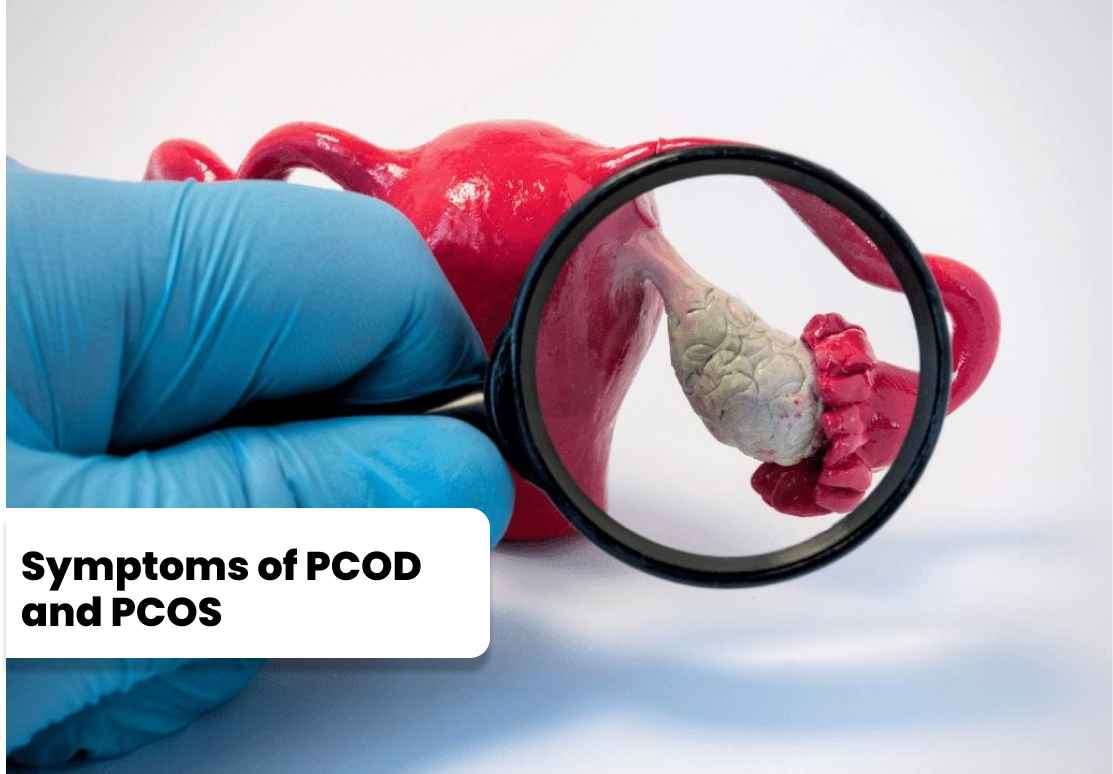
1. Irregular Menstrual Cycles: Women with PCOD/PCOS often experience irregular or infrequent periods, or they may even experience prolonged periods.
2. Hormonal Imbalances: PCOD/PCOS can cause elevated levels of androgens, leading to symptoms such as acne, excess hair growth (hirsutism), and male pattern baldness.
3. Ovarian Abnormalities: The presence of multiple cysts on the ovaries can be detected through an ultrasound examination, a key diagnostic indicator of PCOD/PCOS.
4. Weight Gain: Many women with PCOD/PCOS struggle with weight gain or find it difficult to lose weight due to insulin resistance and metabolic disturbances.
The exact cause of PCOD/PCOS is still not fully understood. However, several factors are believed to contribute to its development, including: 1. Hormonal Imbalances: Imbalances in the levels of hormones such as insulin, luteinizing hormone (LH), follicle-stimulating hormone (FSH), and androgens play a role in PCOD/PCOS.
2. Genetic Predisposition: There is evidence to suggest that PCOD/PCOS may have a genetic component, with a higher likelihood of occurrence in women with a family history of the condition.
3. Insulin Resistance: Insulin resistance, a condition in which the body's cells become less responsive to insulin, is commonly observed in women with PCOD/PCOS. This can lead to increased insulin production and hormonal imbalances.
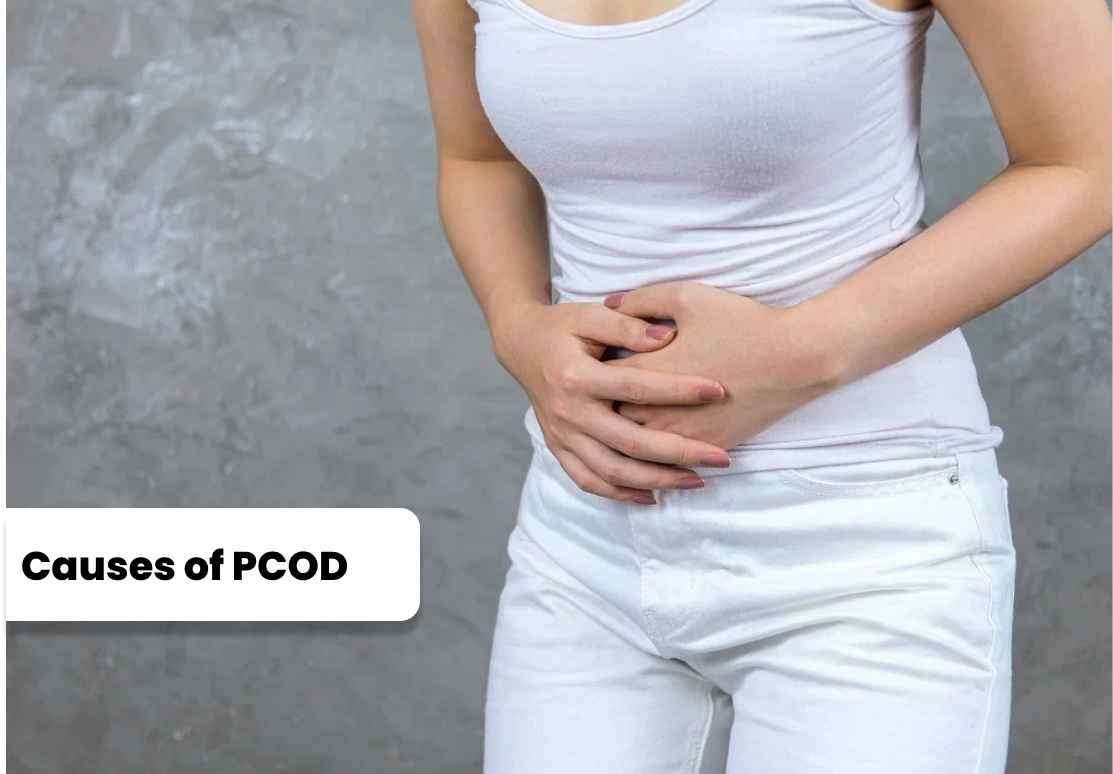
The exact cause of PCOD/PCOS is still not fully understood. However, several factors are believed to contribute to its development, including:
1. Hormonal Imbalances: Imbalances in the levels of hormones such as insulin, luteinizing hormone (LH), follicle-stimulating hormone (FSH), and androgens play a role in PCOD/PCOS.
2. Genetic Predisposition: There is evidence to suggest that PCOD/PCOS may have a genetic component, with a higher likelihood of occurrence in women with a family history of the condition.
3. Insulin Resistance: Insulin resistance, a condition in which the body's cells become less responsive to insulin, is commonly observed in women with PCOD/PCOS. This can lead to increased insulin production and hormonal imbalances.
While there is no known cure for PCOD/PCOS, there are various treatment options available to manage the symptoms and improve overall health. The treatment approach may vary depending on an individual's specific symptoms, medical history, and reproductive goals. Some common treatment options include: 1. Lifestyle Modifications: Adopting a healthy lifestyle, including regular exercise, a balanced diet, and stress management, can help regulate menstrual cycles, manage weight, and improve insulin sensitivity. 2. Medications: Hormonal contraceptives, such as birth control pills, can help regulate menstrual cycles and control androgen levels. Anti-androgen medications may also be prescribed to address symptoms such as acne and excessive hair growth. 3. Fertility Treatments: In cases where PCOD/PCOS affects fertility, assisted reproductive techniques such as ovulation induction, intrauterine insemination (IUI), or in vitro fertilization (IVF) may be considered. 4. Surgical Interventions: In certain cases, minimally invasive surgical procedures, such as ovarian drilling, may be recommended to improve ovulation and restore fertility
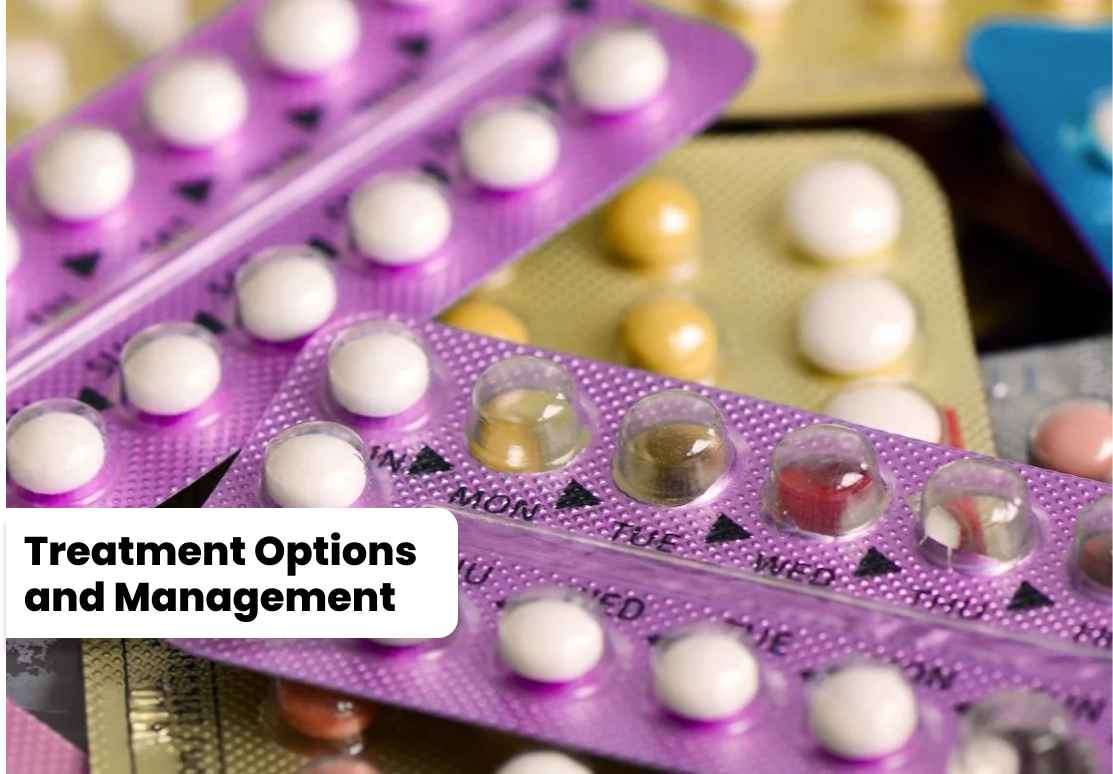
While there is no known cure for PCOD/PCOS, there are various treatment options available to manage the symptoms and improve overall health. The treatment approach may vary depending on an individual's specific symptoms, medical history, and reproductive goals. Some common treatment options include:
1. Lifestyle Modifications: Adopting a healthy lifestyle, including regular exercise, a balanced diet, and stress management, can help regulate menstrual cycles, manage weight, and improve insulin sensitivity.
2. Medications: Hormonal contraceptives, such as birth control pills, can help regulate menstrual cycles and control androgen levels. Anti-androgen medications may also be prescribed to address symptoms such as acne and excessive hair growth.
3. Fertility Treatments: In cases where PCOD/PCOS affects fertility, assisted reproductive techniques such as ovulation induction, intrauterine insemination (IUI), or in vitro fertilization (IVF) may be considered.
4. Surgical Interventions: In certain cases, minimally invasive surgical procedures, such as ovarian drilling, may be recommended to improve ovulation and restore fertility
It refers to the presence of polycystic ovaries on both sides. PCOD is a hormonal disorder that affects the ovaries and is characterized by the development of multiple small cysts. Bilateral PCOD is a term used to describe the involvement of both ovaries in this condition.
Bilateral PCOD can have several implications for affected individuals: 1. Menstrual Irregularities: Women with bilateral PCOD often experience irregular or absent menstrual cycles due to disrupted ovulation patterns. This can lead to difficulties in predicting and planning for menstruation. 2. Fertility Challenges: Bilateral PCOD is associated with difficulties in conceiving. The hormonal imbalances and irregular ovulation can make it challenging for eggs to mature and be released for fertilization. 3. Hormonal Imbalances: Elevated androgen levels in bilateral PCOD can lead to symptoms such as acne, excess hair growth (hirsutism), and male pattern baldness. 4. Metabolic Issues: Bilateral PCOD is often associated with insulin resistance, a condition where the body's cells become less responsive to insulin. This can lead to weight gain, difficulties in losing weight, and an increased risk of developing type 2 diabetes.
.jpg)
It refers to the presence of polycystic ovaries on both sides. PCOD is a hormonal disorder that affects the ovaries and is characterized by the development of multiple small cysts. Bilateral PCOD is a term used to describe the involvement of both ovaries in this condition.
Bilateral PCOD can have several implications for affected individuals:
1. Menstrual Irregularities: Women with bilateral PCOD often experience irregular or absent menstrual cycles due to disrupted ovulation patterns. This can lead to difficulties in predicting and planning for menstruation.
2. Fertility Challenges: Bilateral PCOD is associated with difficulties in conceiving. The hormonal imbalances and irregular ovulation can make it challenging for eggs to mature and be released for fertilization.
3. Hormonal Imbalances: Elevated androgen levels in bilateral PCOD can lead to symptoms such as acne, excess hair growth (hirsutism), and male pattern baldness.
4. Metabolic Issues: Bilateral PCOD is often associated with insulin resistance, a condition where the body's cells become less responsive to insulin. This can lead to weight gain, difficulties in losing weight, and an increased risk of developing type 2 diabetes.
1. Lifestyle Modifications: Adopting a healthy lifestyle, including regular exercise, a balanced diet, and stress management, can help regulate hormonal imbalances, manage weight, and improve overall well-being. 2. Medications: Hormonal contraceptives, such as birth control pills, can help regulate menstrual cycles and control androgen levels. Other medications, such as those targeting insulin resistance or promoting ovulation, may be prescribed based on individual needs. 3. Fertility Treatments: In cases where bilateral PCOD affects fertility, assisted reproductive techniques, such as ovulation induction or in vitro fertilization (IVF), may be considered to help individuals achieve pregnancy. 4. Regular Monitoring: Ongoing monitoring and follow-up with healthcare professionals are essential to assess the effectiveness of the treatment plan, manage symptoms, and address any potential complications.
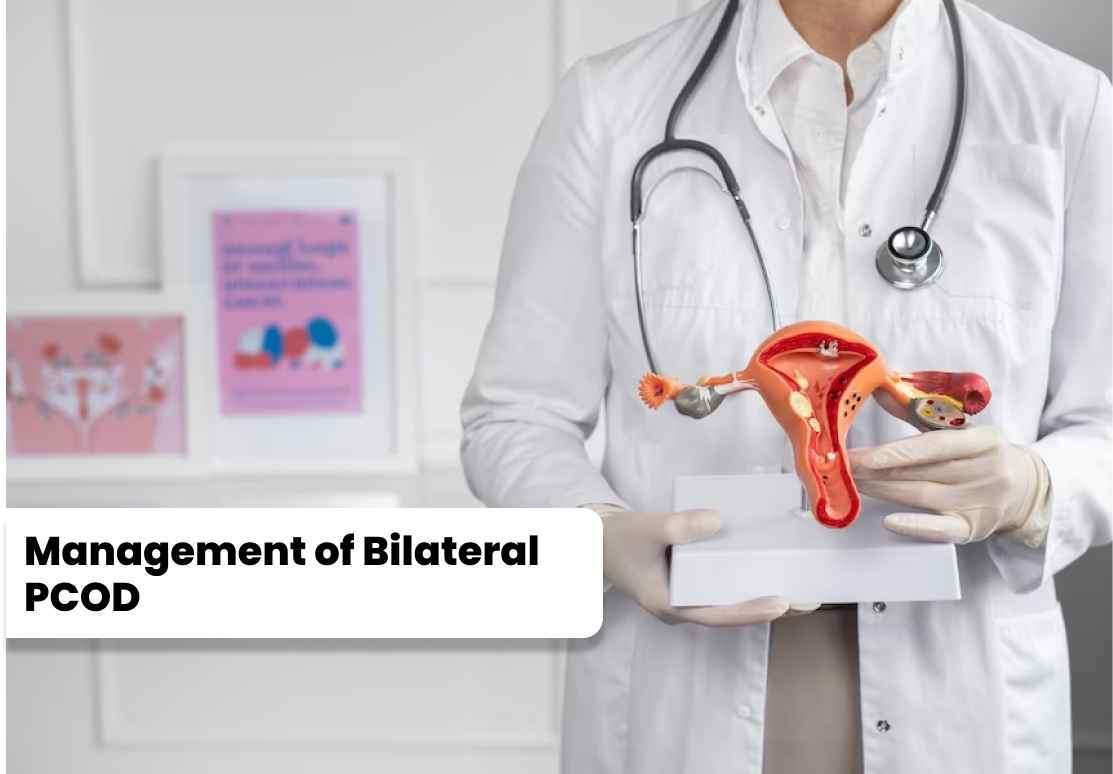
1. Lifestyle Modifications: Adopting a healthy lifestyle, including regular exercise, a balanced diet, and stress management, can help regulate hormonal imbalances, manage weight, and improve overall well-being.
2. Medications: Hormonal contraceptives, such as birth control pills, can help regulate menstrual cycles and control androgen levels. Other medications, such as those targeting insulin resistance or promoting ovulation, may be prescribed based on individual needs.
3. Fertility Treatments: In cases where bilateral PCOD affects fertility, assisted reproductive techniques, such as ovulation induction or in vitro fertilization (IVF), may be considered to help individuals achieve pregnancy.
4. Regular Monitoring: Ongoing monitoring and follow-up with healthcare professionals are essential to assess the effectiveness of the treatment plan, manage symptoms, and address any potential complications.
|
Serial No |
City |
Minimum Cost (INR) |
Average Cost (INR) |
|
1 |
Mumbai |
10,000 |
50,000 |
|
2 |
Delhi |
8,000 |
45,000 |
|
3 |
Bangalore |
7,000 |
40,000 |
|
4 |
Chennai |
6,000 |
35,000 |
|
5 |
Kolkata |
5,000 |
30,000 |
|
6 |
Hyderabad |
5,000 |
30,000 |
|
7 |
Pune |
4,000 |
25,000 |
|
8 |
Ahmedabad |
4,000 |
25,000 |
|
9 |
Jaipur |
3,500 |
20,000 |
|
10 |
Chandigarh |
3,500 |
20,000 |
|
11 |
Lucknow |
3,000 |
15,000 |
|
12 |
Indore |
3,000 |
15,000 |
|
13 |
Kochi |
2,500 |
12,000 |
|
14 |
Coimbatore |
2,500 |
12,000 |
|
15 |
Bhopal |
2,000 |
10,000 |
|
16 |
Nagpur |
2,000 |
10,000 |
|
17 |
Goa |
1,500 |
8,000 |
|
18 |
Mangalore |
1,500 |
8,000 |
|
19 |
Trivandrum |
1,200 |
6,000 |
|
20 |
Guwahati |
1,200 |
6,000 |
|
Serial No |
Hospital Name |
Address |
Contact Number |
|
1 |
All India Institute of Medical Sciences (AIIMS) |
Ansari Nagar, Aurobindo Marg, New Delhi - 110029 |
+91-11-26588500 |
|
2 |
Post Graduate Institute of Medical Education and Research (PGIMER) |
Sector-12, Chandigarh - 160012 |
+91-172-2747585 |
|
3 |
Sanjay Gandhi Postgraduate Institute of Medical Sciences (SGPGIMS) |
Rae Bareli Road, Lucknow, Uttar Pradesh - 226014 |
+91-522-2668700 |
|
4 |
JIPMER (Jawaharlal Institute of Postgraduate Medical Education and Research) |
Dhanvantari Nagar, Puducherry - 605006 |
+91-413-2296000 |
|
5 |
Sree Chitra Tirunal Institute for Medical Sciences and Technology (SCTIMST) |
Medical College P.O., Thiruvananthapuram, Kerala - 695011 |
+91-471-2524266 |
|
6 |
King George's Medical University (KGMU) |
Chowk, Lucknow, Uttar Pradesh - 226003 |
+91-522-2257450 |
|
7 |
Nizam's Institute of Medical Sciences (NIMS) |
Punjagutta, Hyderabad, Telangana - 500082 |
+91-40-23489000 |
|
8 |
Government Medical College and Hospital (GMCH) |
Sector 32, Chandigarh - 160030 |
+91-172-2601023 |
|
9 |
Institute of Medical Sciences (IMS), Banaras Hindu University (BHU) |
Lanka, Varanasi, Uttar Pradesh - 221005 |
+91-542-2367568 |
|
10 |
Osmania General Hospital |
Afzal Gunj, Hyderabad, Telangana - 500012 |
+91-40-24600146 |
Please Wait..